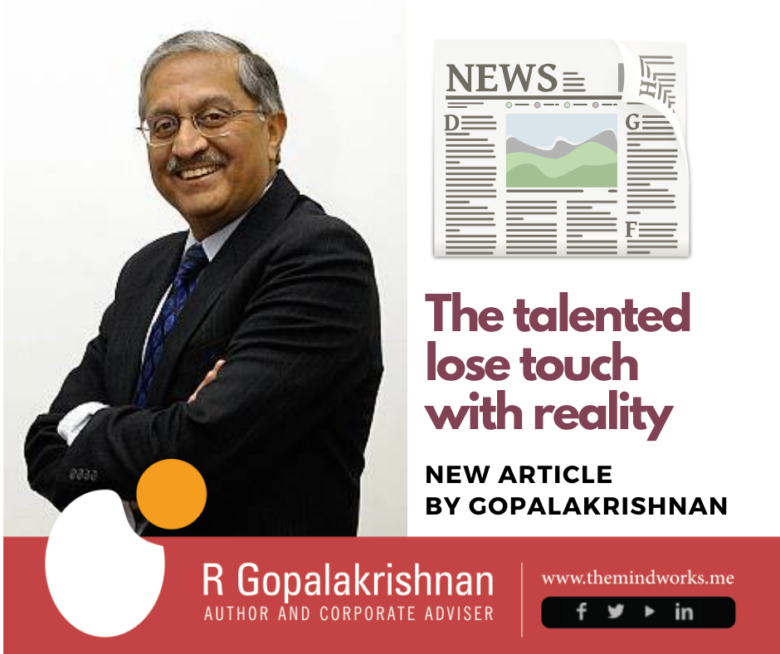12th October 2018 BUSINESS STANDARD
R. Gopalakrishnan*
*The writer is a corporate advisor and Distinguished Professor of IIT Kharagpur. His new book, “CRASH: lessons from the rise and exit of business leaders” will be published by Penguin India in December, 2018.
Email: rgopal@themindworks.me
Just as bugs in the air can damage everybody, power can damage every leader. Most leaders learn to mitigate the effects, but those who don’t, appear in the public glare. I use ‘CEO’ for business leaders with power—company promoters, government-controlled PSUs and PSBs, and professional CEOs. Power affects all, though in India, professionals can exercise power only with the promoter’s support.
A confession first: I have experienced the heady effects of power during my career and survived. Now, I am able to reflect dispassionately about power over employees, associates, boards and media. The increasing exits of magnetic chieftains makes news: leaders at Kingfisher, Religare, ICICI, YES and IL&FS in India, Audi in Germany, WPP in UK, Danske Bank in Denmark, GE and TESLA in America.
cultural and psychological factors are relevant, so remedies also emanate there. The subject is highly topical now and, luckily for me, my forthcoming book is on this subject. Power is like wealth. The more you chase it, the more its destructive capacity. Power corrupts, and absolute power corrupts absolutely.
Power reduces emotional capacity and damages the leader’s brain. Power is akin to a strong magnetic field, disturbing the alignment of iron filings. This emotional incapacity manifests visibly–arrogance, pomposity, delusions of heroism, mad pursuit of visibility, not listening, treating people rudely and so on, leading to perceptions like “This is not the same person we knew.” When the source of power is switched off, the leader may become nice again!
What exactly happens inside the brain?
As a leader acquires power, physical and hormonal changes occur in the brain. My forthcoming book lists several studies, among them, the work of Professor Landau at Chicago, Professor Pamela Smith at Netherlands, and Professor Sukhvinder Singh Obhi at McMaster, Canada. Professor Obhi placed the heads of leaders under a TCMS machine to study what happens (trans-cranial magnetic stimulation). Sec 164 of the Companies Act requires that a CEO should not be of unsound mind. Future regulators may mandate that CEOs should be TCMS-tested every year and the results disclosed in the Directors’ Report!
Their legal duties apart, some or all independent directors can serve as a walking voice for the powerful CEO. Experienced peer Directors can do this because they are not mere watchdogs. They advise, coach and cajole CEOs. If these work, fine, or else, a director must warn, and, if necessary, quit because loyalty is to the institution, not to the leader. That is the dharma of the wise ID (My article in BS, 11th May, 2018). Many boards, particularly PSB and PSU boards, are dysfunctional because decisions are made outside the board meeting.
The solution principally lies with the leader, who must take special care to listen and contemplate upon the walking inner voice, as King Vikramaditya did in mythology; IDs can help the CEO ‘to stand back and view the painting.’ Think about how Krishna spoke to Arjuna in the Mahabharata about duty and action, how Vibhishana confronted Ravana about the morality of executing Hanuman, how wife Clementine implored husband Winston Churchill about his crass behavior, and what Bagger Vance–distortion of Bhagawan–did for R (anulph) Junah—distortion of Arjuna– in the acclaimed film, “The legend of Bagger Vance”, acted by Will Smith and Matt Dimon respectively.
The walking voice counsels the roaming ego to listen, reflect and to stay grounded/humble.
If an ID’s advice on important matters is not heeded by an un-listening CEO, then quit. We don’t hear much about independent directors quitting due to negative prodromal signals from the CEO–more on prodromal next month. In public affairs, VP Singh quit around the Rajiv Gandhi/ Bofors matter and SBI’s RK Talwar did so when Sanjay Gandhi bullied him. Surely there must be some corporate IDs who quit in protest–oh for a wisdom code!
For sure, independent directors do not know the business intricacies and suffer from information asymmetry. However, they should be wise judges of narcissism, which establishes its presence through many signals. Imagine being associated with TERI five years ago or Patanjali Ayurved, and not sensing the leader’s narcissism!
JRD Tata reminded us that transformers lead with affection, “I am one who will make full allowance for a man’s character and idiosyncrasies….at times, it involves suppressing yourself. It is painful but necessary…”
However when that cup of affection and indulgence becomes empty, then it is time to act.

